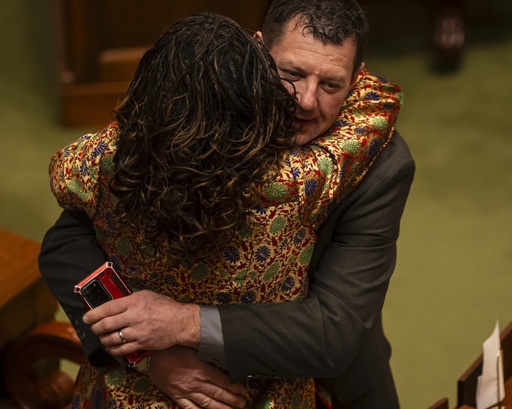ST. PAUL, Minn. — After a lengthy impasse, Minnesota House Democrats returned to the Capitol on Thursday, following a newly established power-sharing agreement with Republicans that had stalled official operations for over three weeks.
As part of the accord, House Republican leader Lisa Demuth from Cold Spring has been elected as speaker for a two-year term. Notably, Demuth becomes the first person of color to hold the speaker position in the chamber’s history.
All 66 Democrats had refrained from participating in House activities since January 14, aiming to block the quorum of 68 members required for the chamber’s functionality. The attendance shifted when Secretary of State Steve Simon conducted a roll call, where all but one Democrat and all 67 Republicans were present, allowing Demuth to officially take the gavel amidst a standing ovation from both parties.
Following the election, negotiations for a power-sharing arrangement commenced with expectations of a 67-67 tie in the House. However, a December court ruling disqualified a Democratic candidate for not residing in the district he was elected to, temporarily giving Republicans a one-seat majority and jeopardizing the agreement.
A special election is set for March 11 to fill this vacant seat, where the Democratic candidate is anticipated to win, reinstating the expected tie. Subsequently, most committees will be co-chaired by both parties, maintaining equal representation, although Republicans will lead a committee focused on investigating fraud in government programs.
The agreement includes provisions to limit the speaker’s typical wide-ranging powers. Major legislative decisions, such as the selection of bills for debate, will require consensus from both parties, preventing Demuth from unilaterally blocking any legislation.
In her inaugural address to the House, Demuth emphasized her commitment to nurturing a respectful and productive debating environment, stating, “The residents of Minnesota have provided us with a unique opportunity with this closely divided house. They expect collaboration over partisan politics to yield solutions that truly serve them.”
While Republicans believe they achieved significant victories during negotiations, Democrats argued that the final arrangement closely resembled their earlier proposals submitted prior to the session’s commencement. Top House Democrat and former Speaker Melissa Hortman expressed her frustrations, stating, “It is regrettable that it took nearly four weeks to reach this agreement. We could have honored the voters’ wishes and commenced with a collaborative spirit from the outset.”
Historically, the last instance of a tied House was in 1979, where party leaders also reached a power-sharing agreement amidst lengthy discussions. Republicans obtained the speakership while Democrats led the three most influential committees, a system that was mostly effective until it collapsed during the session’s final days, requiring a special session to finalize crucial legislations.
The National Conference of State Legislatures indicates that tied chambers are not particularly uncommon and often function better than anticipated. Under the arrangement in Minnesota, Democrats received commitments from Republicans that they will not attempt to remove a Democrat who barely won reelection by 14 votes in a contentious district where 20 ballots were reported missing. Although an ethics committee will investigate this election, it will take no further action.
In an escalation of tension, the Republican Party of Minnesota has initiated a campaign to recall all 66 Democratic representatives, a process that is notoriously challenging and projected to span approximately ten months according to party officials. While the agreement does not necessitate halting the recall efforts, Democrats are hopeful that the courts will dismiss such petitions, as has occurred in similar situations in the past.
State GOP Chair Alex Plechash asserted their resolve, stating, “We will maintain the recall process to ensure that the Democrats face consequences for their inactivity.”



